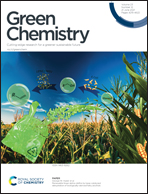Biosynthesis of non-animal chondroitin sulfate from methanol using genetically engineered Pichia pastoris†
Abstract
Chondroitin sulfate (CS) is widely applied in the medical, clinical, and nutraceutical fields. However, all commercialized CS is extracted from animal tissues, which is associated with many problems, such as heavy reliance on antibiotics, animal excrement waste and long breeding time. Here, we developed a promising new green route for the de novo biosynthesis of non-animal CS from methanol, a one-carbon compound, using the engineered Pichia pastoris cell factory. Firstly, three exogenous genes, namely kfoC and kfoA from Escherichia coli K4 and tuaD from Bacillus subtilis, were introduced into P. pastoris to construct the chondroitin synthesis pathway, which yielded 5.5 mg L−1 chondroitin. After optimizing the expression of committed enzymes by codon optimization, the production of chondroitin improved by approximately 35-fold to 189.8 mg L−1. Thereafter, 6 kinds of Kozak sequences and 10 different endogenous promoters were compared and applied to achieve the expression of active chondroitin-4-O-sulfotransferase (41.3 U L−1). After integrating the chondroitin biosynthesis and sulfonation modules, the engineered strain, Pp006, successfully produced 182.0 mg L−1 CSA [GlcA-GalNAc (4S)] with a sulfation degree of 1.1%. We further improved the sulfation degree to 2.8% by strengthening the 3′-phosphoadenosine-5′-phosphosulfate (PAPS) supply with the overexpression of adenosine-5′-triphosphate sulfurylase and adenosine 5′-phosphosulfate kinase. In the fed-batch cultivation, the final titer of CSA reached 2.1 g L−1 and the sulfation degree increased to 4.0%. Moreover, the results suggest that the P. pastoris cell factory could be used as a green route to produce other sulfated glycosaminoglycans.

- This article is part of the themed collection: 2021 Green Chemistry Hot Articles


 Please wait while we load your content...
Please wait while we load your content...